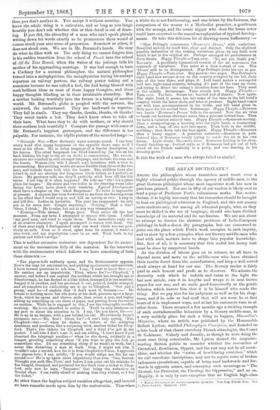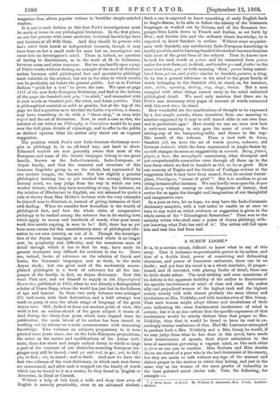THE ARYAN DICTIONARY.*
AMONG the philosophers whose researches must reach even a highly educated public through the agency of middle-men, is the great German philologist whose most important work has now in part been printed. Not one in fifty of our readers is likely ever to read a page of Professor Pott's voluminous works. But, never- theless, it is highly necessary that his researches should be brought to bear on philological education in England, and this not among mere students only, but among all educated people, who, as they must be skilled in the use of language, should also have distinct knowledge of its material and its mechanism. We are not about to attempt to discuss the abstruse problems of ludo-European philology iu half-a-dozen dry paragraphs, but are concerned to point out the place which Pott's work occupies in such inquiry, and to show by a few examples what our literary middle-men who deal with such matters have to shape into popular knowledge. But, first of all, it is necessary that this useful but heavy task must be done by competent hands.
As the division of labour goes on in science, we all have to depend more and more on the middle-men who have obtained their results direct from the manufacturer, and keep a well sorted stock always at hand for our use. The literary trader is fairly paid in such honour and profit as he deserves. We admire the dexterity with which he unfolds and turns to the light the last new article, cuts it in lengths and wraps it in neat brown paper for our use, and we smile good-humouredly at the gentle delusion which haunts him that it is he himself who made the thing. But we pay him for his judgment as well as for his shop- room, and if he sells us bad stuff that will not wear, he at first hears of it in unpleasant ways, and at last his customers turn in at other doors. There occurred a few months ago a striking example of such untradesmanlike behaviour by a literary middle-man, in a very unlikely place for such a thing to happen, Macmillan's Magazine, where an article was published by the Honourable Robert Lytton, entitled Philosophy in CuneiAnn, and founded on a late book of that clever crotchety French ethnologist, the Count de Gobineau. Calmly and fluently, as though he were doing the most sane thing conceivable, Mr. Lytton desired the magazine- reading British public to consider whether the researches of Grotefend, Rawlinson, Oppert, and the rest may not be all moon- shine, and whether the "series of bewildering scratches," which we call cuneiform inscriptions, may not be mystic rows of broken talismanic ejaculations, capable of being read backwards and for- wards in opposite senses, and conveying such meanings as "The Eternal, the Protector, the Fleeting, the Oppressive," and so on. Happily, it is only by rare exception that an English high-class
Wurzel- IriirterLudi der Indagermanischen Sprachen. Von Aug. Friedr. Putt. Vol L, Parts 1 and 2. Detmeld. 1567.
magazine thus allows popular writers to bewilder simple-minded readers.
It is not in such fashion as this that Pott's investigations must be made at home in our philological literature. In the first place, no one but persons with some moderate technical knowledge have any business at all with them. And they should be persons who have tried their hands at independent research, though it may have been on but a small scale for none but an investigator can enter into an investigator's mind. There is, indeed, no question of having to discriminate, as in the work of M. de Gobineau, between sense and utter nonsense. But we can hardly open a page of Pott's works without finding an example of the need of discrimi- nation between solid philological fact and speculative philology most valuable to the student, but not in the state in which results can be profitably set before the general public. Let us in Puritan fashion " prick for a text " to prove the case. We open at page 1117 of the new Indo-European dictionary, and find at the bottom of the page the Sanskrit root pay, " to stink," and connected with it such words as Sanskrit pad, the civet, and Latin putidus. This is philosophical material as solid as granite, but at the top of the page we find a question as to whether the Latin tripudium, a dance, may have something to do with a " three- step," or even with tripod and the art of divination. Now, in such a case as this, the instinct of our writer on Philosophy in Cuneiform would be to pass over the dull plain details of etymology, and to offer to the public as distinct opinion what his author only threw out as vaguest suggestion.
The position which Pott's new Indo-German dictionary occu- pies in philology is, in an off-hand way, not hard to show. Educated readers are now generally aware that most of the European and some of the Asiatic languges belong to one great family, known as the Indo-Germanic, Indo-European, or Aryan family, and that the material and structure of this immense linguistic group is, on the whole, best represented by one ancient tongue, the Sanskrit. But how slightly a genuine philological training has as yet touched the average European literary mind, we may judge from the way in which our own weaker writers, when they have something to say, for instance, on the relation of Hindustani to English, are not ashamed to quote a rule or theory from Max Miiller's lectures with the very examples he himself uses to illustrate it, instead of giving instances of their own finding. When we consider how boundless is the wealth of philological fact, and how the whole claim of comparative philology to be ranked among the sciences lies in its stating laws which apply to scores and hundreds of words, what poor mean work this servile copying is seen to be ! Still, there has as yet been some excuse for this unsatisfactory state of philological edu- cation in our own country, as out of it. Though the investiga- tion of the Aryan languages as a connected whole is no longer new, its perplexity and difficulty, and the monstrous mass of detail through which it has to find its way, have made its general treatment very difficult for students to rise to. There are, indeed, books of reference on the relation of Greek and Latin, the Germanic languages, and so forth, to the main Aryan stock ; but one great need of the moderately accom- plished philologist is a book of reference for all the lan- guages of the family, in fact, an Aryan dictionary. Now this want Pott saw, and set himself to supply in his Etymological Researches, published in 1833, when he was already a distinguished scholar of Franz Bopp, whom the world has just lost in the fullness of age and honour. In these two early volumes were arranged 375 verb-roots, with their derivatives, and a bold attempt was made to grasp at once the whole range of language of the great Aryan race. Still, looked at from our modern point of view, this work is but an outline-sketch of the great subject it treats of. And during the thirty-four years which have elapsed since its publication, the main labour of its author has been turned to working out its scheme on a scale commensurate with increasing knowledge. Two volumes on subjects preparatory to it were printed some years since, one on the Indo-European prepositions, the other on the nature and modifications of the Aryan verb- roots, those few short and simple radical forms to which so large a part of the contents of our dissimilar-sounding European lan- guages may still be traced, i and gee and mid, to go ; pat, to fall ; plu, to flow ; sta, to stand ; and so forth. And now we have the first two volumes of the root-dictionary, in which such root-forms are enumerated, and after each is mapped out the family of words which can be traced to it as a source, be they found in English or Armenian, in Zend or Cornish.
Without a help of this kind, a wide and deep view even of English is scarcely practicable, even to an advanced student. Such a one is expected to know something of early English back to Anglo-Saxon, to be able to follow the history of the Germanic languages as worked out by Grimm, and of the Romance lan- guages from Latin down to French and Italian, as set forth by Diez ; and besides this and the ordinary classic knowledge, he is expected to know Sanskrit in outline. Without some acquaint- ance with Sanskrit, any satisfactory Indo-European knowledge is hardly possible, and in learning Sanskritthe student becomes familiar with most of the great lines of the subject. Thus he knows how to look for such words as potion and its connected form poison under the root-form pci, to drink, and to refer pen and feather to the same root-form, pat, as both meaning flyer,' penna being assimi- lated from pet-na, and feather similar to Sanskrit patatra, a wing, So be has a general reference in his mind to the great family of words belonging to the Sanskrit stha, to stand, as, for instance, state, stable, apostasy, destiny, stop, stage, stanza. But a man occupied with other things cannot carry in his mind unlimited philological detail. We need only mention that there are in Pott's new dictionary sixty pages of account of words connected with this root stare, to stand.
How wonderful are the ramifications of thought to be expressed by a few simple sounds, whose transition from one meaning to
suggested by it may be still traced alike in our own time and in prehistoric ages ! How clearly we can see even now how a verb-root meaning to mix gave the name of crater to the- mixing-cup of the banqueting-table, and thence to the cup- like mouth of the volcano. From a root verb to know, Sanskrit fad, we have the set of words ignotus, unknown, old German unkund ; while the form represented in Anglo-Saxon by unciidh changes its sense so suggestively in uncouth. Being, future,. physic, a boor, the monophysite controversy, what divergent and yet comprehensible connection runs through all these up to the root-form which we find in Sanskrit as bha, to be or grow. How our memory of Naples and the Grotto of Posilippo revives at the suggestion that it may have been named, from its ancient burial- place, Pausilypon, " censer of grief " ! But it is needless to go on citing instance after instance. We can hardly even open the Aryan Dictionary without coming on such fragments of history, that revive for us again the thought and imagination of our thoughtful and imaginative race.
In a year or two, let us hope, we may have the Indo-Germanie dictionary complete, with a vast index to enable us at once to. turn to any word on which evidence or suggestion is given in the whole series of the "Ethnological Researches." Then woe to the unlucky writer who shall raise a point of Aryan philology with- out knowing what Pott has said of it ! The critics will fall upon him and tear him leaf from leaf.































 Previous page
Previous page